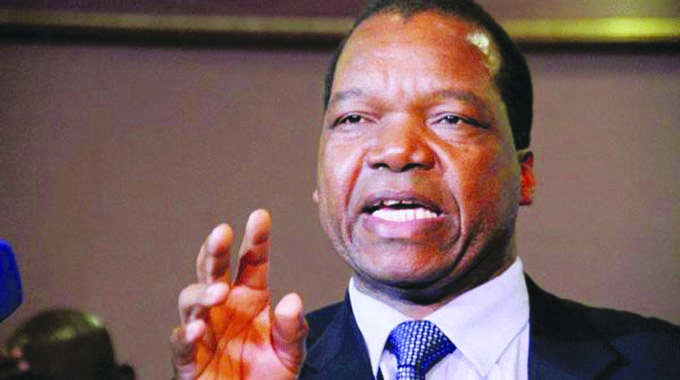Economic growth targets will be achieved — RBZ

Africa Moyo and Zvamaida Murwira
Economic growth targets for the year will be achieved if all stakeholders remain focused on achieving the goals set out in the National Development Strategy 1, the Reserve Bank of Zimbabwe has said.
The economy is primed to grow by 7,4 percent this year, driven by strong growth in agriculture, mining, electricity, construction, transport and communication as well as finance and insurance.
Already, a number of successes have been noted regarding the implementation of NDS1 in the first quarter, with the country poised for the best harvests in two decades as a bumper 2,7 million tonnes of maize are expected following good rains and the Pfumvudza/Intwasa programme that capacitated so many small-scale farmers, commercialising their operations for the first time.
Further, the manufacturing sector is now expanding, with capacity utilisation now averaging 47 percent from as low as 20 percent resulting in more local products occupying significant space on supermarket shelves.
By year end, capacity utilisation is expected to rise to 61 percent, driven by the positive economic policies that have been unveiled by Government, especially around managing inflation, which has brought back predictability on the market.
Month-on-month inflation is in the low single figures since the foreign currency auction system stabilised exchange rates from August last year, while year-on-year inflation has spectacularly plunged from 654 percent to 161,91 percent for the month of May, and expected to drop to below 50 percent by August as the last of the high-inflation months from last year are no longer in the statistics.
Last week, RBZ Governor Dr John Mangudya said all economic fundamentals were pointing in the positive direction, and that he remains optimistic the economy will continue to register growth as Zimbabwe pushes to attain an empowered and prosperous upper middle income economy, consistent with Vision 2030.
“Government and RBZ have got a firm belief that this economy, for it to continue stabilising, we need to produce, productivity and production are the answers to this country,” said Dr Mangudya, while giving oral evidence before Parliament’s portfolio committee on Lands and Agriculture last week.
“We give priority to all products in Zimbabwe, cotton, tobacco and maize and all the traditional crops. For this country to continue on the right path that we are seeing, the economy is stable, inflation and exchange rate are stable, we need to produce more.
“We expect the economy to continue to grow this year and the growth of the economy comes from agriculture and we are saying the white gold (cotton), we need to support it as much as possible.”
Mangudya, while giving oral evidence before Parliament’s portfolio committee on Lands and Agriculture last week.
“We give priority to all products in Zimbabwe, cotton, tobacco and maize and all the traditional crops. For this country to continue on the right path that we are seeing, the economy is stable, inflation and exchange rate are stable, we need to produce more.
“We expect the economy to continue to grow this year and the growth of the economy comes from agriculture and we are saying the white gold (cotton), we need to support it as much as possible.”
The parliamentary committee, chaired by Gokwe Nembudziya legislator Justice Mayor Wadyajena had invited Dr Mangudya and other stakeholders in the agriculture sector to get an update on the payment of cotton farmers for the produce delivered last season.
As part of efforts to grow the economy, the central bank and the Bankers Association of Zimbabwe will this week announce the modalities of payment of interest on deposits to encourage more people to use the formal banking system.
However, demand accounts, call accounts, which are used for purposes of transacting without necessarily making savings, may not attract interest. The RBZ wants money to stay in a bank for at least a short while so that the bank could be able to lend to productive sectors of the economy, and the account holder can then get interest.
Most demand accounts are used to hold salaries, or are used by employers to pay salaries, so tend to empty at some stage during a month.
Pan-African Chamber of Commerce board member Mr Langton Mabhanga also said there has been demonstrable market confidence and economic stability, especially if the recent performance of the Zimbabwe Stock Exchange and rise in capacity utilisation was taken into consideration.
Mr Mabhanga called on policy makers to continue advancing laws that inject confidence in both domestic and foreign investment.
“Particular attention must be given to laws that stop commodity leakages and pilferage. We need consequential laws that outlaw hoarding of mining claims for speculative purposes,” he said.
“Zimbabweans have come of age, mature beyond the sponsored traditional contrarian political narratives. Zimbabweans are now itchy to participate in building their country under the Second Republic. That too makes fertile ground for economic growth.
“We need to continue to imagine more innovative incentives for new and expansion of manufacturing projects especially those with potential for either export market or import substitution or both.”
Mr Mabhanga said the interventions by Government will result in the attainment of an upper middle income economy “much quicker”.
“Let’s galvanise our economy and embolden our spine against the purveyors of economic sanctions, knowing that the more we achieve the more they are embittered,” he said.
In a recent interview, economist Dr Prosper Chitambara said the macroeconomic stability that has been witnessed over the past few months as evidenced by the slowdown in inflation and the projected rebound in the economy, “have resulted in an increase in economic confidence”.
“We need to see more institutional reforms especially around parastatals, which have been a major let down (if the economic growth was to be sustained),” said Dr Chitambara.
Government last week introduced Statutory Instrument 127 of 2021, to ensure companies that obtain funds from the forex auction at about $85 to stock shops or purchase raw materials, should be penalised for selling goods using the parallel market rate of over US$1: $100.
The move is aimed at cushioning consumers from profiteering businesses.











Comments